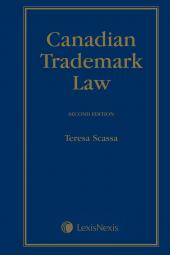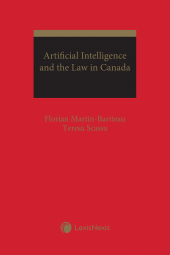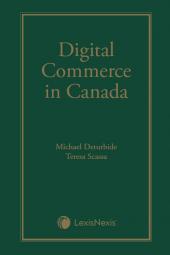Canadian Trademark Law, 2nd Edition
One Year Subscription Only Terms
Subscribers receive the product(s) listed on the Order Form and any Updates made available during the annual subscription period. Shipping and handling fees are not included in the annual price.
Subscribers are advised of the number of Updates that were made to the particular publication the prior year. The number of Updates may vary due to developments in the law and other publishing issues, but subscribers may use this as a rough estimate of future shipments. Subscribers may call Customer Support at 800-833-9844 for additional information.
Subscribers may cancel this subscription by: calling Customer Support at 800-833-9844; emailing customer.support@lexisnexis.com; or returning the invoice marked 'CANCEL'.
If subscribers cancel within 30 days after the product is ordered or received and return the product at their expense, then they will receive a full credit of the price for the annual subscription.
If subscribers cancel between 31 and 60 days after the invoice date and return the product at their expense, then they will receive a 5/6th credit of the price for the annual subscription. No credit will be given for cancellations more than 60 days after the invoice date. To receive any credit, subscriber must return all product(s) shipped during the year at their expense within the applicable cancellation period listed above.
Détails des produits
Recent amendments to the Trade-marks Act have produced some of the most significant changes in this area of the law since the 1950s. In this new edition of Canadian Trademark Law, renowned intellectual property expert Teresa Scassa discusses how these amendments have changed the pre-existing legislative framework and, consequently, how they will change the practice of trademark law in Canada.
What's Inside
Canadian Trademark Law, 2nd Edition provides a thorough analysis of the recognition, protection, enforcement and loss of trademarks rights both under the Trade-marks Act and through the common and civil law. Scassa examines the processes for the registration and maintenance of trademark rights, as well the judicial oversight of those processes. Readers will also benefit from Scassa's knowledgeable discussion of the emerging issues and challenges resulting from the recent legislative amendments.
The latest edition of Canadian Trademark Law offers:
- An overview of the changes resulting from Bill C-8: Combating Counterfeit Products Act (CCPA) and Bill C-59: The Economic Action Plan 2014 Act (EAP 2014 Act) – some of which will not come into effect until late 2016. This text will serve as a valuable transition tool as each chapter discusses the law as it was in May 2015 with explanations about how the amendments will affect it, once they take effect.
- A Table of Amendments that identifies the major changes to the Trade-marks Act brought about by the CCPA and the EAP 2014 Act, including information about which amendments in the two Acts are identical and the circumstances where the EAP 2014 Act amendments will supersede those in the CCPA. This table also summarizes the effect of each amendment and cross-references to provisions of the old Act that are changed, moved or repealed.
New in this volume
Turn to Canadian Trademark Law, 2nd Edition for a comprehensive examination of:
- Potential implications for the protection of Canadian geographical indications in light of Canada's recent trade agreements with the European Union and Korea.
- Notable developments from the courts, including the Supreme Court of Canada's ruling in Masterpiece Inc. v. Alavida and the Federal Court of Appeal's judgment in Marlboro Canada Ltd. v. Philip Morris Products SA
- The expansion of trademark rights, including the new definition of "trademark"
- The Canadian Intellectual Property Office's new practice of accepting registration of sound marks
- How the registration of trademarks in Canada has – and will – change as a result of the EAP 2014 Act amendments.
- The CCPA amendments that have added new grounds for finding trademark infringement
- The Canadian Internet Registration Authority's newly revised domain name dispute resolution policy and the impact of the Federal Court's decision in HomeAway.com Inc. v. Hrdlicka
- New Top-Level Domains introduced by the Internet Corporation for Assigned Names and Numbers as well as the dispute resolution mechanisms designed to address the challenges TLDs pose for trademark owners' rights in relation to domain names
- Changes specific to Quebec, including recent issues and litigation surrounding Quebec's attempt to prescribe how trademarks are presented linguistically when they are part of a business name and CIRA's imminent decision to allow the registration of domain names with French language characters
A practical resource
Canadian Trademark Law, 2nd Edition will be a timely and valuable reference book for:
- Intellectual Property lawyers who need to understand the amendments to the Act and their impact on this rapidly changing area of the law so they can effectively counsel their clients
- In-house counsel who are tasked with assisting their companies in handling IP assets and dealing with potential trademark issues
- Trademark examiners, agents and CIPO staff members who need to stay abreast of changes in this area of the law
- Law professors and students who are interested in keeping up with the latest developments in trademark law
Table des matières
Table of Cases
Introduction
Chapter 1: Trademarks in Context
Chapter 2: Defining "Trademarks"
Chapter 3: The Register of Trademarks, Administrative Process, Judicial Review and Appeal
Chapter 4: Prohibited Marks
Chapter 5: Registrability of Trademarks
Chapter 6: Trademark Invalidity
Chapter 7: Section 7 of the Trademarks Act and the Tort of Passing Off
Chapter 8: Infringement of Registered Trademarks
Chapter 9: Trademark Infringement and the Internet
Chapter 10: Parallel Importation and Counterfeiting
Chapter 11: Trademarks and the Freedom of Expression
Table of Amendments
 Lexis Nexis
Lexis Nexis 

